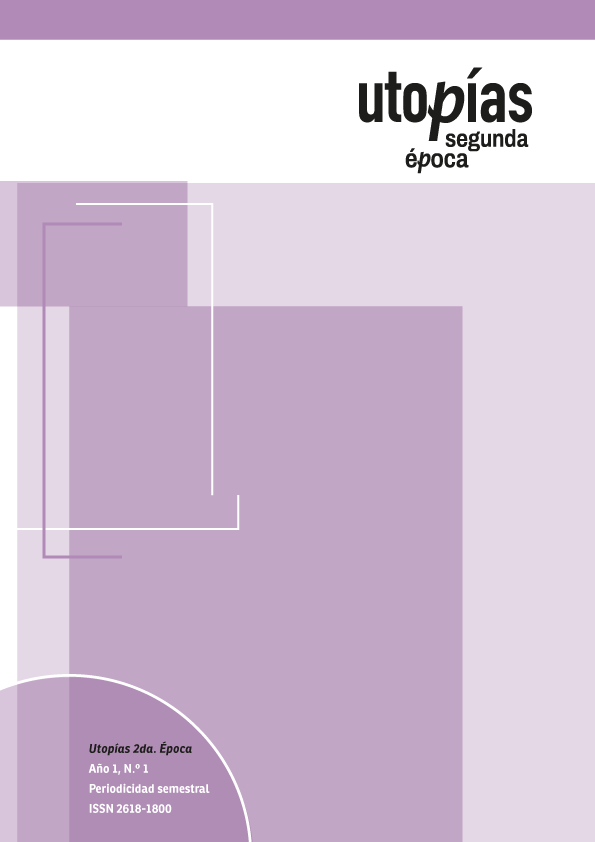Imagining a perfect society. The significance of Utopia throughout history
Main Article Content
Abstract
The objective of this work is to make a historical‑conceptual journey about what utopia has meant for humanity and what are the main motivations for it to be considered a possible response to the dissatisfaction of existing conditions. This will be done exposing through different eras and trying to follow a chronological order, showing how communities and societies found in utopias ways to imagine an ideal world where to solve their present problems by creating fictitious worlds to escape from reality or to imagine a better future. The authors of the most important utopias will be exposed, as well as the types (theological, social reengineering, political‑institutional, naturalistic, architectural‑urban, literary, revolutionary, anarchist, among others) and what they consisted of to shape Western civilization as the we know today. We will start by tracing utopia in ancient Greece with Plato's Republic, going through Thomas More's Utopia, and from there presenting the state of the art during the Renaissance, Humanism, the Enlightenment, Modernity (excepting Totalitarianism), until reaching the 21st century, where utopia continues to be a way of addressing social, political and economic problems, imagining a better future for all.
Downloads
Article Details

This work is licensed under a Creative Commons Attribution-NonCommercial-ShareAlike 4.0 International License.
Las ediciones no tienen cargos para las y los autores ni para las y los lectores, y se incita a las y los autores a depositar sus contribuciones en otros repositorios institucionales y temáticos, con la certeza de que la cultura y el conocimiento son un bien de todos y para todos. Utopías. Segunda época permite la reutilización luego de su edición (Post print) citando la autoría y la fuente original de su publicación. Su uso no puede ser con fines comerciales.
References
ANDREAE, J. V. (1996). Cristianópolis. Akal.
BACON, F. (2017). La Nueva Atlántida. Fondo Cultura Económica.
BRAVO, G. M. (1976). Historia del socialismo 1789 1848. El pensamiento socialista antes de Marx. Ariel.
BUBER, M. (1955). Caminos de utopía. Fondo de Cultura Económica.
CABET, E. (1999). Viaje a Icaria (2 tomos). Folio.
CAMPANELLA, T. (2007). La ciudad del Sol. Tecnos.
GEORGE, H. (1935). Progress and poverty. An inquiry into the cause of industrial depressions and of increase of want with increase of wealth. The remedy. Kingsport press inc.
GODWIN, W. (1971). An Enquiry Concerning Political Justice. And its influence on General Virtue and Happiness. Oxford University Press.
HARRINGTON, J. (1924). Oceana. Heidelberg: Vetenskaps Societeten I.
HUS, J. (2014). De ecclesia (The Church). Nabu Press.
HUXLEY, A. (2020). Un mundo feliz. Ediciones Castillo.
KROPOTKIN, P. (2005). La conquista del pan. Libros de Anarre.
LANDAUER, G. (2016). La Revolución. Una filosofía social propia. NED Ediciones.
LENIN (2010). El estado y la revolución. La doctrina marxista del estado y las tareas del proletariado en la revolución. Biblioteca Virtual Omegalfa.
MAQUIAVELO, N. (2019). El príncipe. Editorial Alma.
MARX, K. y ENGELS, F. (2013). El Manifiesto Comunista. Nórdica Libros.
MORO, T. (2007). Utopía. Editorial Espasa.
ORWELL, G. (1980). 1984. Salvat editores.
OWEN, R. (1927). A New View of Society: or Essays on the Principle of the Formation of Human Character, and the Application of the Principle to Practice. E. P. Dutton & CO. INC.
OWEN, R. (1836). Book of the New Moral World. Effingham Wilson, Royal Exchange.
OWEN, R. (2015). Textos del socialista utópico. CSIC.
OWEN, R. (2007). A New View of Society and Other Writings. Penguin.
PLATÓN (1988). República en Diálogos IV. Editorial Gredos.
PLUTARCO (1986). Vida de Licurgo en Vidas Paralelas (Tomo I). Gredos.
PROUDHON, Pierre Joseph (2005). ¿Qué es la propiedad? Investigaciones sobre el principio del derecho y del gobierno. Libros de Anarres.
SAN AGUSTÍN (2018). La Ciudad de Dios. Creative Media Partners, LLC.
TEPEDINO, N. (2014). Arquitectura y utopía. En Argos, Vol. 31, n.° 60 61, pp. 121 127.
THOREAU, H. D. (2007). Walden, o la vida en los bosques. Grupo Editorial Tomo.
